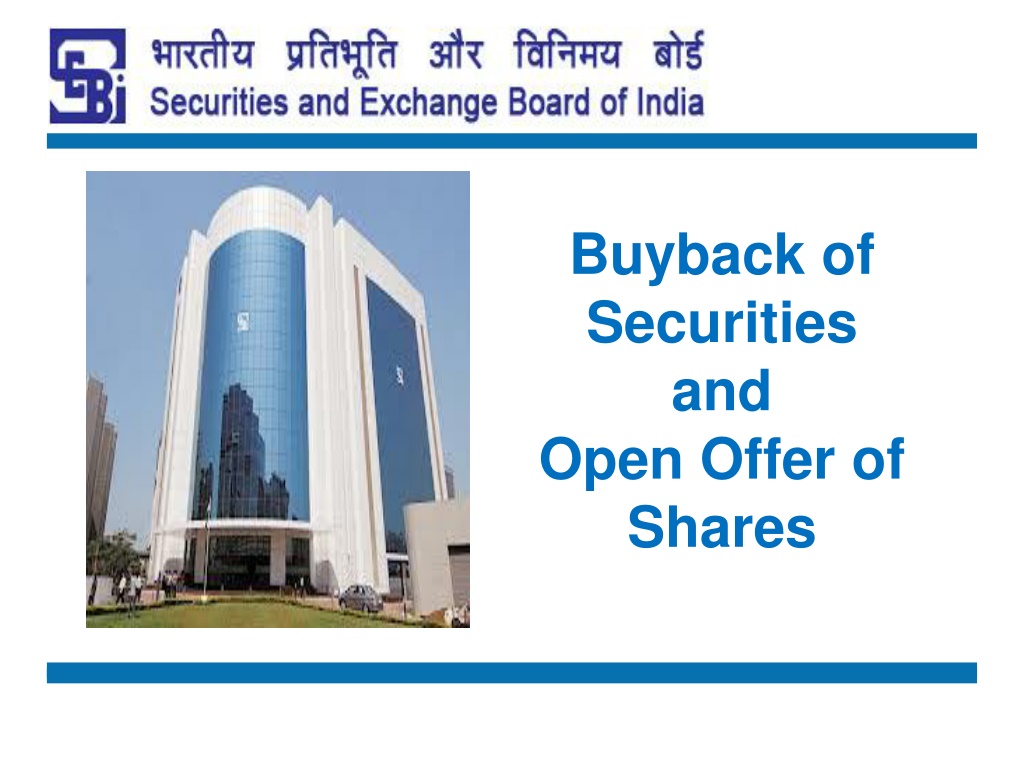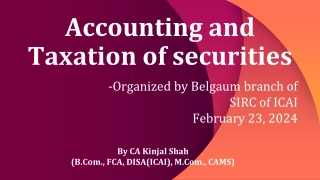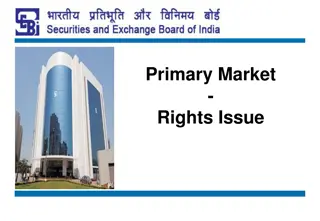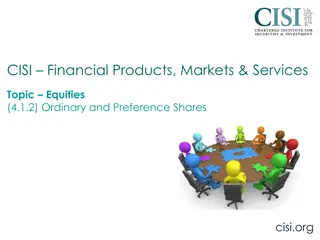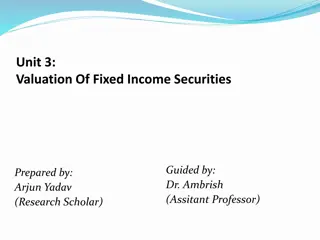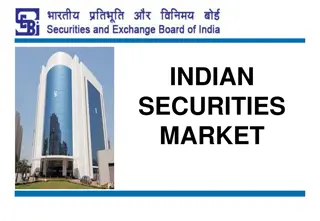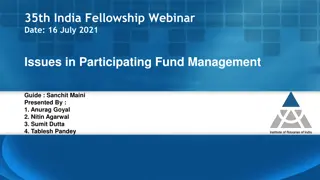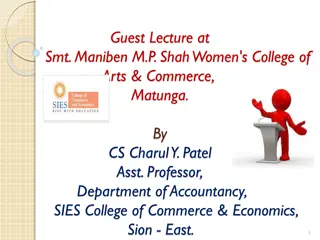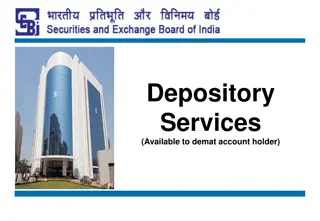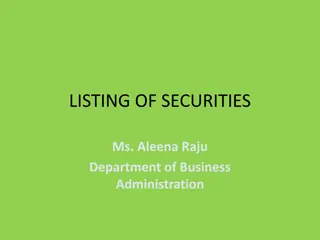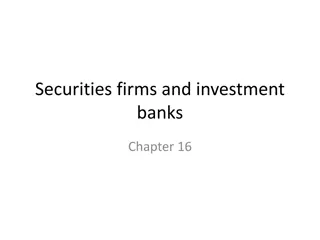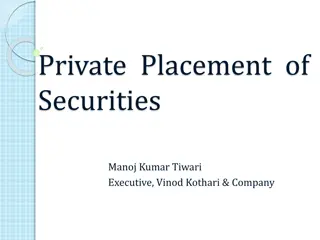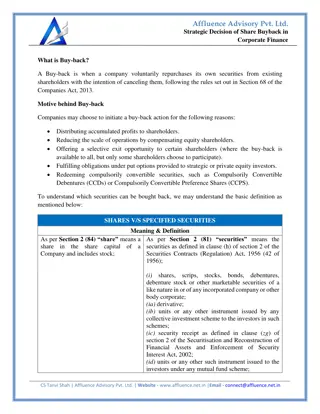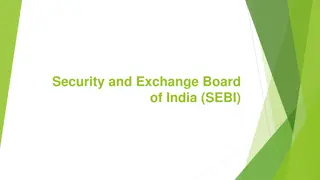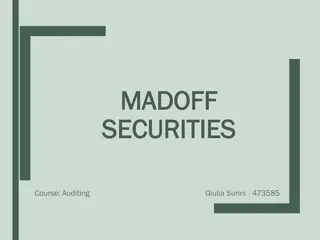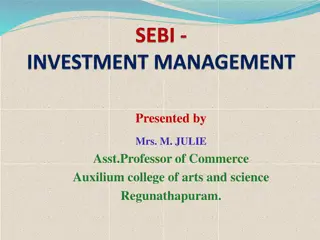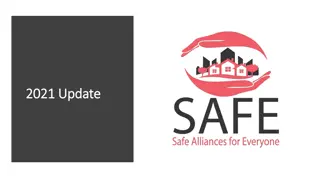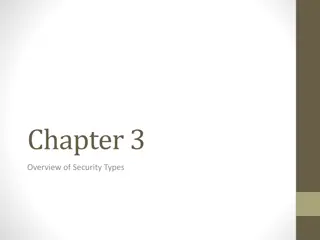Understanding Buyback of Securities and Open Offer of Shares
Buyback of securities is a corporate action where a company repurchases its own shares from existing shareholders, opposite of a public issue. Common reasons include returning surplus cash to shareholders, improving return on equity, and enhancing earnings per share. Conditions for buy-back include limits on buy-back amount and debt-to-equity ratio, along with the need for special resolutions. This presentation provides insights on what buyback is, methods, reasons, application process, and considerations before participating.
Download Presentation

Please find below an Image/Link to download the presentation.
The content on the website is provided AS IS for your information and personal use only. It may not be sold, licensed, or shared on other websites without obtaining consent from the author. Download presentation by click this link. If you encounter any issues during the download, it is possible that the publisher has removed the file from their server.
E N D
Presentation Transcript
Buyback of Securities and Open Offer of Shares
Disclaimer 2 Information contained in this presentation is as on August 31, 2021. This presentation may be used with the permission of SEBI and only for non-profit awareness programs, This presentation is only for Educational and Awareness Programs and not for any legal interpretations.
Buyback of Securities
Flow of Presentation 4 1. What is Buyback of Securities 2. Methods of Buyback of Securities 3. Common reasons for Buy-back 4. How to apply in a Buyback 5. Points to ponder before participating in Buyback
What is Buyback of Securities 5 The Corporate action where a company repurchases its own shares from its existing shareholders Buyback : Opposite of public issue of shares In a public issue, company sells its shares in the stock market In a Buyback, company offers to buy shares from the investors. After buyback, those shares are extinguished.
Common reasons for Buy-back 6 To return surplus cash to shareholders Issue of shares Improve return on equity shares through distribution of cash Improve earnings per share (EPS) by reduction of shares (buy-back reduce the total number of shares of the company) Company Shareholders Shareholders get option either to sell shares and receive cash or not to sell shares and get an increase in percentage shareholding post buyback without additional investment Buyback of shares
Conditions for Buy-back 7 Maximum Buy- back Limit <= 25% of (Paid-up capital + Free Reserves) Debt to Equity Ratio* < 2:1 Approved Special/ Board Resolution by Board Resolution would suffice if Buy-back <= 10% of (Paid up capital + Free Reserves) Special Resolution required, if more than 10% Cooling period# 1 year from the date of expiry of buyback period *Paid up capital & free reserve # No offer of buy-back should be made by a company within a period of one year from the date of the closure of the preceding offer of buy-back
Methods of Buyback 8 Buyback Open Market (Stock exchange Mechanism) Odd lot Buyback Tenderoffer Tender offer : Shareholders can tender their shares on a proportionate basis Odd Lot Buyback : Provisions of buy-back through tender offer shall be applicable Open Market: Shareholder can sell shares in the secondary markets
Buy Back - Tender offer 9 Reservation for small shareholders: 15% of the no. of securities proposed to buy back or no. of securities entitled as per their shareholding, whichever is higher Public Announcement (PA) within 2 working days of special resolution or Board resolution. Record date for determining the entitlement. Dispatch of Final letter of offer within five working days from the receipt of communication of comments from SEBI Tendering period opens not later than 5 days from the date of dispatch of letter of offer Tendering remains open for a period of 10 days
Methods of Buyback (Comparison) 10 For Buyback, a public announcement made by Company TENDER ROUTE OPEN MARKET ROUTE Limit on Buyback Size Up to 25% of Net Worth Up to 15% of Net Worth Multiple pricing subject to cap of maximum offer price Pricing Fixed Price Shareholders Participation Only Record Date shareholders All shareholders Retail Shareholders Reservations 15% of buyback size to be reserved for small shareholders N.A. Offer Period 10 working days 6 months^ ^ In open market route, the Company has the option to close the buyback, once it achieves the maximum buyback size or utilizes at least 50% of the amount earmarked for buyback, whichever is earlier
Offer Price & Record Date 11 Price at which: Shares will be bought back by the Company Offer price determined by the Board of the Company OPEN MARKET TENDER OFFER Offer Price Multiple pricing subject to cap of maximum offer price Fixed Price When is it beneficial for shareholders to tender their shares? Offer Price is equal to/ higher than the market price Opportunity for the shareholders to exit thinly traded stock Cut-off to determine the: Eligibility to participate in buyback Entitlement Ratio Dispatch of LOF & Tender Form OPEN MARKET TENDER OFFER Record Date & Significan ce Record Date is determined Record Date Not applicable as buyback is open to all shareholders
Tender Route - How to Apply? 12 THIRD PARTY REGISTERED BROKER/ COMPANY s BROKER SHAREHOLDER s BROKER * Participate through stock broker and make a bid by using quick unique client code ( UCC ) facility Participate through Brokers APP/ Website Indicate buyback bid to the broker who will in turn place the bid Will process bids received from eligible shareholders Submit an application on plain paper by providing all requisite details 1) Shareholders can tender shares as per their entitlement ratio (given in public announcement) 2) Shareholders holding physical shares shall bid through the broker 3) * If shareholder s broker is not registered with the designated stock exchange for buyback, then the shareholder can approach any registered stock broker/ Company Broker to make a bid, using UCC facility
Tender Route Trade & Settlement 13 Shareholder to approach the Broker to participate in Buyback (provide details of number of shares to be tendered) Transfer the tendered shares to special A/C of Clearing Corporation Broker to bid using the acquisition window of the stock exchange Buyback Closure Direct transfer of accepted shares to Company s A/C + Settlement Date Finalization of Basis of Acceptance Return of unaccepted shares back to the shareholders by the Clearing Corporation Receipt of buyback consideration by the shareholder Broker to issue contract note to the shareholder
Open Market Route How to Apply? 14 DEMAT SHAREHOLDING PHYSICAL SHAREHOLDING SNAPSHOT OF OPEN MARKET TRADE Tendering can be done only after shares are dematerialized and hence physical shareholders to approach the concerned depository participant for the same Shareholder Company TDay Places Trade T Day Places Buy order T+2 Shares T+1 Shares SELLER BROKER COMPANY BROKER CLEARING CORPORATION T+2 T+2 T+1 Money T+2 Money Receipt of Money Receipt of Shares in buyback Escrow A/C
Points to ponder before participating in Buyback 15 Participation in Buyback is voluntary Shareholders holding shares as on Record Date shall only be eligible to tender their shares in the Buyback. Decide to participate if one feels that the share price in the market is overvalued or you don t believe company will perform well in going forward. Read disclosures made by company in the public announcement Basis for arriving at the buyback price For buyback through: In an open market method : Understand the no. of shares, quantum, objective of buyback and maximum buyback price. In a tender method: understand no. of shares, quantum, objective of buyback, entitlement ratio and buyback price.
16 Open Offer of Shares
Flow of Presentation 17 1.What is Open Offer of Shares 2. Methods of Open Offer of Shares 3. Why Open Offer is mandated 4. How to apply in an Open Offer 5. Points to ponder before participating in Open Offer
What is an Open Offer? 18 What is an Open Offer? An Offer given by an Acquirer to the shareholders of a company to buy their shares at a fixed price. When is the Offer made? Mandatory Offer When the shareholding of Acquirer increases beyond the prescribed limit or in case of change in control of company. Voluntary Offer Voluntarily acquire through an Open Offer . What should the size be? Mandatory Offer Min offer size of 26% `of the total paid up capital up to max 100%. Voluntary Offer Min offer size of 10% of the total paid up capital up to max 75%
Why Open Offer is mandated 19 Any substantial acquisition of shares results in change in ownership Change in ownership of company may result following changes: Company management Business profile Company Strategy Business plans Hence, to give fair exit to investor in case they don t agree with change of ownership.
Acquisition 20 means OR Indirectly Directly Agreeing to Acquire OR Acquiring Shares OR Voting Rights OR Control Target Company
Offer Size 21 Number of shares to be acquired from public: In Mandatory Open Offers: Minimum 26% of the share capital If post offer holding >maximum permissible non public shareholding (MPNPS), acquirers to undertake to bring it back within 1 year. In voluntary offers by shareholders holding more than 25% Size at least 10%, shall not be such so as to cross MPNPS.
Mandatory and Voluntary Open Offer 22 Mandatory Open Offer Acquirer Target Company Public Shareholders Owns > 25%<75% Acquires >5% in FY Owns < 25% Exceeds 25% stake No control Acquires control Mandatory Open Offer > 26% Voluntary Open Offer Owns > 25%<75% Existing Shareholder Target Company Public Shareholders Voluntary acquisition through Open Offer > 10%
Activities and Timeline 23 To be published on the date of trigger Date of Public Announcement (PA) for open offer To be published within 5 working days of PA Detailed Public Statement (DPS) Dispatch of Letter of Offer to the shareholders Letter of offer issued by acquirer containing details of open offer. To be dispatched within 7 working days from the receipt of SEBI Comments on the Draft Letter of Offer. Offer to open Offer to close Offer to remain open for 10 working days Payment of consideration, transfer of shares Within 10 working days of closure
How Offer Price is Arrived at 24 Offer Price Offer Price is the price at which shares will be bought from the shareholders by the Acquirer Infrequently traded shares Frequently traded shares* The highest of: Determined by the Acquirer and the Manager to the open offer Based on valuation parameters including, (i) Highest price paid by Acquirer / Person acting in concert: negotiated price under the agreement The volume-weighted average price for acquisitions, during the 52 weeks immediately preceding the date of the public announcement book value comparable trading multiples, and The highest price for any acquisition, during the 26 weeks immediately preceding the date of PA such other parameters as are (ii) The volume-weighted average market price for 60 trading days immediately preceding the date of PA (from the exchange where maximum volume is recorded during this period) customary for valuation of shares of such companies *Frequently traded shares means shares of a target company, in which the traded turnover on any stock exchange during the 12 calendar months preceding the month in which the PA is made, is at least 10% of the total number of shares of such class of the target company
Methods of Tendering shares 25 Open offer Stock exchange Mechanism Off-market transfer
Offer Route Off-market 26 Shareholder to make off- market transfer of shares to Escrow Open offer Demat account (account details given in Letter of Offer) Shareholder holding physical shares shall send Original certificates, duly signed transfer deed, copy of PAN card to RTA Shareholder to send Form of Acceptance-cum- Acknowledgment to collection centers of RTA Open Offer Closure Direct transfer of accepted shares to Company s A/C + Settlement Date Finalization of Basis of Acceptance Return of unaccepted shares back to the shareholders by the Clearing Corporation Broker to issue contract note to the shareholder Receipt of consideration by the shareholder
Offer Route Stock Exchange Mechanism In case of dematerialized shares 27 Shareholder to approach the Broker to participate in Open Offer * (provide details of number of shares to be tendered) Transfer the tendered shares to special A/C of Clearing Corporation Broker to bid using the acquisition window of the stock exchange & generate TRS* Open Offer Closure Direct transfer of accepted shares to Acquirer s A/C + Settlement Date Finalization of Basis of Acceptance Return of unaccepted shares back to the shareholders by the Clearing Corporation Receipt of open offer consideration by the shareholder Broker to issue contract note to the shareholder * TRS: Transaction Registration Slip : Contains no of shares tendered, Bid Id No., etc
Offer Route Stock Exchange Mechanism In case of Physical shares 28 For shareholders holding physical shares - Post placement of bid by broker, following documents along with Transaction Registration Slip (TRS) shall be submitted to the Registrar and share transfer agent (RTA) Original share certificate(s) Duly filled valid share transfer form(s) (Form SH-4) (by all registered shareholders in same order and as per the specimen signatures registered with the Target Company) Duly witnessed at the appropriate place authorizing the transfer in favour of acquirer Self-attested copy of the shareholder s PAN card (in case of joint holders, PAN card copy of all transferors)
Withdrawal of Open Offer 29 Statutory Approvals required have been refused. Acquirer, being natural person, has died. Any condition in the agreement is not met for reasons outside the reasonable control of the acquirer Circumstances as in the opinion of the SEBI, merit withdrawal
Points to ponder before participating in Open offer 30 Participation in open offer is voluntary. Read disclosures made by acquirer in the public announcement. Read recommendations of independent directors of the company published in the newspapers before deciding to participate in the open offer. Decide to participate after considering: (i) if believe that the ruling share price in the market is overvalued, (ii) if don t believe that the company will perform well in going forward upon change in control. Tendered bids / shares cannot be withdrawn by the shareholders. Upward offer price revision can be made at any time prior to 3 days of tendering period. Provision for interest payment to the shareholders in case of delay.
Additional Information 31 For further information you may visit the following websites: www.sebi.gov.in www.investor.sebi.gov.in For grievance redressal you may visit: www.scores.gov.in Or you may call at SEBI Toll Free Helpline Numbers between 9:00 am to 6:00 pm: 1800 266 7575 1800 22 7575 The helpline is available in 8 languages; English, Hindi, Bengali, Gujarati, Marathi, Kannada, Telugu and Tamil
